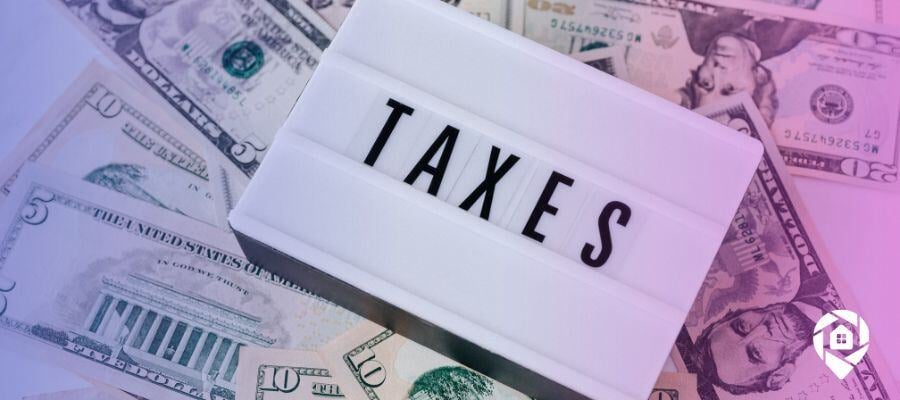
Mastering Capital Gains Tax Calculation for Property Sales

Capital gains tax is something every real estate investor should know about. It’s the tax you might owe when you sell a rental property for more than you paid. Whether you're thinking about selling, reinvesting your profits, or just planning ahead, knowing how to calculate capital gains tax on the sale of property can help you keep more of your money.
In this guide, we’ll break down what capital gains tax means for rental properties and how to figure it out step-by-step, so you can make smart choices with your investments.
Understanding Capital Gains Tax
When you sell a rental property and make a profit, you may have to pay a tax on that profit. This is called capital gains tax, and it’s something every property owner should understand before selling.
What Is Capital Gains Tax?
Capital gains tax is a tax on the profit you make when you sell something valuable, like real estate or stocks. In this case, it applies to rental properties. You only pay this tax when the selling price is higher than what you paid to buy and improve the property.
When Do You Pay Capital Gains Tax?
You’ll owe capital gains tax when the sale is final and you’ve made a profit. The amount you owe depends on how long you’ve owned the property. If you’ve owned it for more than one year, the profit is taxed at a lower, long-term capital gains rate. If you’ve owned it for one year or less, you may pay a higher, short-term rate.
Why It Matters for Real Estate Investors
Understanding this tax is important because it can take a big chunk out of your profits. By learning the rules and using tools like a real estate capital gains calculator, you can figure out how much tax you might owe and make smarter financial choices when selling your rental property.
How to Calculate Capital Gains Tax on Rental Property
Understanding how to calculate capital gains tax can save you money and help you make better investment decisions. Whether you’re selling your first rental or have years of experience, it’s important to know the steps involved and how to get the most accurate estimate.
Step 1: Find the Sale Price
The sale price is how much the buyer paid for your property. This doesn’t include closing costs or real estate agent fees—it’s just the full amount listed on the final sale agreement.
Step 2: Determine the Cost Basis
Your cost basis is what you paid to buy the property, plus any upgrades or renovations you’ve made. This includes improvements like remodeling a kitchen, adding a deck, or installing a new roof. You’ll also subtract any depreciation you’ve claimed over the years, which reduces your basis.
Formula:
Cost Basis = Purchase Price + Improvements - Depreciation
Step 3: Calculate the Capital Gain
Once you know your cost basis, subtract it from the sale price. If the number is positive, that’s your capital gain—the amount you may be taxed on.
Formula:
Capital Gain = Sale Price - Cost Basis
If the number is negative, you have a capital loss, which could be helpful for offsetting other taxable income in certain situations.
Step 4: Apply the Right Tax Rate
Capital gains are taxed differently based on how long you owned the property:
- Short-term capital gains apply if you owned the property for 1 year or less. These are taxed at your regular income tax rate.
- Long-term capital gains apply if you owned it for more than 1 year. These are taxed at a lower rate, typically 0%, 15%, or 20%, depending on your income bracket.
Knowing which category your sale falls into is key to estimating what you’ll owe.
Step 5: Use a Real Estate Capital Gains Calculator
If the math seems confusing, don’t worry—there are tools to help. A capital gains calculator for real estate or house sale capital gains tax calculator can quickly give you an estimate. Just plug in numbers like your purchase price, sale price, years owned, and any improvements, and the tool will do the rest.
This is one of the best ways to avoid surprises and stay in control of your tax bill when selling a rental property. Plus, it helps you plan ahead if you're considering reinvesting in new property or using strategies like a 1031 exchange to delay taxes.
Examples of Capital Gains Tax Calculations
Examples are one of the best ways to understand how capital gains tax works in real life. Here are a few different scenarios to help break it down:
Example 1: Simple Long-Term Capital Gain
You bought a rental property for $300,000 and sold it three years later for $350,000. You also made $20,000 in improvements and claimed $15,000 in depreciation.
Cost Basis = $300,000 + $20,000 - $15,000 = $305,000
Capital Gain = $350,000 - $305,000 = $45,000
Since you owned the property for over a year, your gain is taxed at the long-term capital gains rate, which could be 15% depending on your income.
Estimated Tax Owed = 15% of $45,000 = $6,750
Example 2: Short-Term Sale
You purchased a condo for $250,000 and sold it 10 months later for $275,000. You didn’t make any improvements or claim depreciation.
Cost Basis = $250,000
Capital Gain = $275,000 - $250,000 = $25,000
Because you owned the property for less than one year, the gain is taxed at your ordinary income rate. If you're in a 24% tax bracket:
Estimated Tax Owed = 24% of $25,000 = $6,000
Example 3: Break-Even Sale After Improvements
You bought a duplex for $400,000, made $30,000 in upgrades, and sold it 5 years later for $430,000. You also claimed $25,000 in depreciation.
Cost Basis = $400,000 + $30,000 - $25,000 = $405,000
Capital Gain = $430,000 - $405,000 = $25,000
Even though your selling price only went up by $30,000, the depreciation reduces your cost basis and increases your taxable gain.
Example 4: Capital Loss
You bought a property for $350,000, made no improvements, and sold it 2 years later for $320,000.
Capital Gain = $320,000 - $350,000 = - $30,000 (a loss)
In this case, you have a capital loss, which can be used to offset other capital gains or reduce taxable income up to a certain limit. This can be useful if you’ve had profitable sales in the same year.
Using a rental property sale tax calculator or a sale of rental property tax calculator makes it much easier to figure these numbers out, especially if you've owned the property for a long time or made lots of upgrades.
Ways to Reduce Capital Gains Tax on Sale of Rental Property
Understanding how to reduce capital gains tax can make a big difference in your total profit when selling a rental property. Some common strategies include using a 1031 exchange to reinvest in a similar property, which can delay the tax owed. Others choose to live in the property for at least two of the last five years to qualify for the primary residence exclusion. You might also invest profits into a tax-deferred retirement account.
These approaches can lower or delay what you owe, but each method comes with its own set of rules and limits. It’s important to remember that tax laws can vary depending on where you live and your personal situation.
We are not legal or financial advisors, so before making any decisions, it’s best to speak with a licensed tax professional or financial advisor. They can help you determine which strategies apply to your situation and ensure everything is done legally and correctly.
Conclusion
Before selling any rental property, it’s smart to understand how capital gains tax might affect your profits.
The more you know about how to calculate capital gains tax on sale of property, calculating capital gains tax on property, or how to calculate capital gain tax on sale of property, the better prepared you’ll be to make smart, money-saving choices.
Still, every financial situation is different. For the most accurate and helpful advice, be sure to talk to a licensed tax professional or real estate expert. Using the right strategies, like a rental property sale calculator or a selling rental property capital gains calculator, can help you keep more of your profits and stay on track toward your financial goals. The key is to plan ahead and make informed decisions.

About Samantha Ankney
Samantha is the Social Media Manager at DealMachine, where she oversees all social media strategies and content creation. With 3 years of experience at the company, she originally joined as a Media Specialist, leveraging her skills to enhance DealMachine's digital presence. Passionate about connecting with the community and driving engagement, Samantha is dedicated to sharing valuable insights and updates across all platforms.


